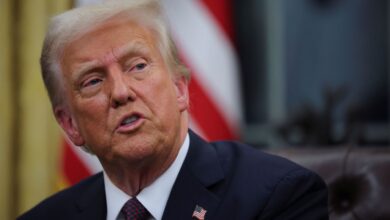With the Egyptian public outraged about a film apparently produced in the US that allegedly insults the Prophet Mohamed, and the American public looking to Obama to condemn the breach of the US Embassy in Cairo by protesters last Tuesday, the governments of both nations have strained to cater to public opinion while still preserving diplomatic relations.
Egypt-US relations had only recently improved following the Muslim Brotherhood's rise to power over the past two years. Experts say that the ongoing conflict, which has touched sensitive nerves in both nations, will put a strain on that fledgling relationship.
But statements made by both governments so far show that, while their first priority is to appease public outrage by taking a firm stance, they’re still not willing to go as far as to endanger relations.
“I think that we are at a very critical juncture in the US-Egypt relationship,” says Robert Danin, a senior fellow in Middle East and Africa studies for the Council on Foreign Affairs, an independent American think-tank.
Danin adds that Morsy has taken a good first step in asserting that Egypt must protect Americans on its soil, but that other issues still need to be addressed.
However, many believe that the US administration’s response also leaves much to be desired. Egyptians are demanding that legal action be taken against those involved in producing the film, beyond mere condemnation of the film itself.
Demanding a strong position
After clips went viral on the internet from “The Innocence of Muslims,” a film produced in the US that allegedly insult the religion of Islam and its Prophet Mohamed, angry protesters — including many members of the conservative Salafi group — demonstrated in front of the US Embassy in Cairo on Tuesday. Some protesters managed to scale the wall surrounding the embassy and take down the American flag, ultimately burning it and raising a black flag demonstrating Islamic faith in its stead.
The US Embassy in Cairo thereafter released a statement condemning what it called “the continuing efforts by misguided individuals to hurt the religious feelings of Muslims,” referring to the film in question.
Other US embassies in the region have also come under attack this week, although the motives behind these other attacks are not completely clear. On Wednesday, the US Consulate in Libya was torched and four members of the American diplomatic convoy killed, including the American ambassador. On Thursday, there was a blast near the embassy in Sanaa and continued protests across the region.
With the Muslim Brotherhood focused on currying popular favor after Morsy’s election in June, and Obama in the heat of his campaign for reelection in the two months before voting begins, both governments have so far prioritized appeasing their publics, as opposed to striving to preserve bilateral relations.
US presidential candidate Mitt Romney took advantage of the situation to accuse Obama of hesitating to condemn what he called a breach of American sovereignty, calling Obama’s position and that of the US Embassy in Cairo a disappointing “[apology] for the right of free speech,” demanding that Obama take a firmer stance against the violence.
The Obama administration has since distanced itself from the embassy’s statement apologizing for the film, saying the statement had not been cleared by Washington.
Absorbing public anger first, maintaining foreign relations second
While the Egyptian government has only mildly condemned the ongoing violence, Obama addressed the issue on Wednesday with staunch rhetoric.
In a televised interview, Obama declared that the American government considers Egypt to be neither an ally nor an enemy.
The relationship between the two governments is still a work in progress, Obama continued, and its future course would be determined by the Egyptian government’s response to the crisis.
“If they [Morsy’s administration] take actions that indicate they’re not taking these responsibilities [seriously], as all countries do where we have embassies, I think we’re going to have real big problems,” Obama said.
On Thursday, state TV in Egypt aired a message from Morsy recorded in Brussels addressing the issue.
Morsy began his speech with a strong condemnation of the film that started the uproar.
“The sacred Islamic values and the Prophet Mohamed are a red line for all of us Muslims and Egyptians, and we consider anyone who insults our Prophet an enemy,” Morsy said.
Later in the speech, Morsy condemned the attack on the embassy and asserted that Egypt is capable of protecting the foreign embassies and convoys on its soil.
“This is our position and this is our religion — we don’t assault anyone, but we also don’t accept assaults on what we hold sacred,” Morsy continued.
Morsy added that in a phone call with Obama, he demanded that legal action be taken against those who made the film.
Danin says that the ongoing events could have a damaging effect on Egypt-US relations, as US foreign policy is shaped not only by the president, but also by the congress and by public opinion.
“I think the American people want to help Egypt, but they will want to believe that this is an Egypt that we want to help. When our embassy is attacked, and especially on September 11, this hits raw nerves with American people, and that will affect how we view the word,” says Danin. “American leaders are constrained by the public [opinion].”
Over the past few months, the US administration has shown eagerness to develop strong ties with Egypt's new leaders, as demonstrated by US Secretary of State Hillary Clinton’s visit to Egypt in July. Most recently, an American delegation came to Egypt to discuss economic cooperation this week, at the time that the embassy events broke out.
Danin says that the Egyptian government has already taken a step in the wrong direction in its management of the conflict.
The Muslim Brotherhood has called for demonstrations on Friday in front of major mosques to voice their condemnation of the film. They claim, however, that the protests will be peaceful and will stay away from all embassies.
“This relationship is going to develop over time. We’re at a very sensitive moment — how [the Egyptian government] handles it over the days and weeks to come is going to matter. But for the president of Egypt to focus more on [organizing] new demonstrations tomorrow, peaceful or not, rather than on the embassy — this is going to touch a raw nerve in US,” says Danin.
However, Mahmoud Shokry, the former Egyptian ambassador to Syria, says that in the struggle to find balance between controlling public anger in Egypt and maintaining good relations with the US, Morsy made the right call.
“There is public outrage and if he [Morsy] says that there’s nothing wrong, their anger would be doubled,” says Shokry, adding that taking action to protest the film, like the protests planned by the Brotherhood, is necessary in order to maintain a strong official response to the incident.
Damage control
Shokry dismisses worries that the strong rhetoric on both sides are a sign of strained relations, claiming that it is just a show to appease the public. The fact that Morsy and Obama spoke on the phone shows that they are trying to find a middle ground to resolve the issue, he says.
Later on Thursday, both countries tried to demonstrate that they are still maintaining good relations.
The US embassy published a summary of the phone call between the presidents. The summary stated that Obama rejected attempts to denigrate Islam, and Morsy asserted that Egypt would uphold its responsibility to protect American personnel on its soil.
The White House also issued a statement on Thursday to clear the confusion around Obama’s statement that Egypt was not an ally, saying it was an unplanned response to an unexpected question which “folks are reading too much into.”
Tommy Vietor, White House spokesperson, said on Thursday that Obama didn’t intend to signal any changes in Egypt-US relations by this statement.
Secretary of State Hillary Clinton also made a strong statement against the controversial film on Thursday, claiming that the US administration has no relation to the film, rejects its message and considers it disgusting and reprehensible.
Conciliatory efforts have also been made by the Egyptian side. In a column published in the New York Times on Thursday, Muslim Brotherhood deputy head Khairat al-Shater said that the Brotherhood doesn't hold the American government or people responsible for the film and condemned the failure to protect the US embassy on Tuesday, asserting that the events have to be investigated.
"We hope that the relationships that both Americans and Egyptians worked to build in the past couple of months can sustain the turbulence of this week’s events. Our nations have much to learn from each other as we embark on building the new Egypt," Shater wrote.
Shokry adds that the Egyptian government has already fulfilled America’s request to protect its embassy. Central Security Forces have reportedly used tear gas and birdshot to attempt to force protesters away from the embassy since Wednesday, and clashes between police forces and protesters are ongoing as of Friday morning.



